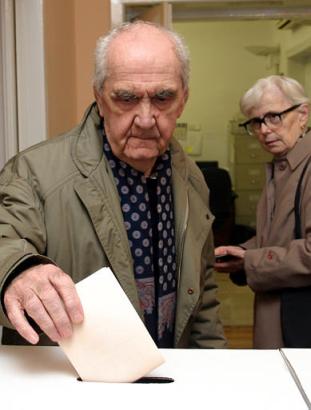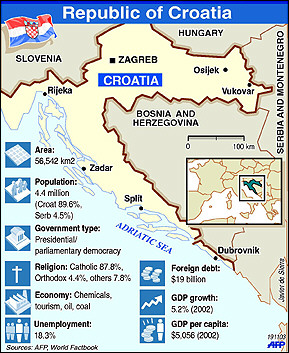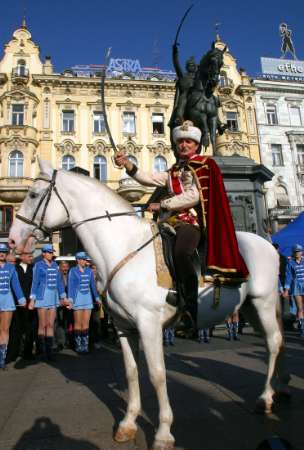Vote at your Consulate General from 7am to 7 pm. November 22-23
Glasajte u Vasem Konzulatu od 7 ujutro do 7 vecer, 22-23 Sudeni
VOTING ABROAD 2003 - TODAY & TOMORROW

A Bosnian Croat cast his ballot for general elections in neighboring Croatia in Sarajevo on Saturday, Nov. 22, 2003. The dual citizens are part of a worldwide diaspora that started voting one day ahead of Sunday's national elections in Croatia. (AP Photo/Hidajet Delic)
At your Consulate General from 7am to 7 pm. November 22-23
Glasajte u Vasem Konzulatu od 7 ujutro do 7 vecer, 22-23 Sudeni

A map and factfile of Croatia, ahead of parliamentary elections on Sunday(AFP)
AFP - Nov 20 3:42 PM

Ivo Sanader, leader of the Croatian Democratic Union, better known by its Croatian acronym, HDZ, is seen during an interview, in his headquarters in Zagreb. Darko Bandic / AP

Slaven Letica, a candidate for the rightwing Croatian Party of Right (HSP), poses on horseback with traditional cape and sword, in front of a 19th century hero monument in Zagreb on November 20. Croatia holds parliamentary elections on November 23 and HSP is likely to get at least 10 percent, according to surveys. REUTERS/ Nikola Solic
Former ruling nationalist party claims it's reformed and ready to return to power
ASSOCIATED PRESS
ZAGREB, Croatia, Nov. 18 — Its leaders are courteous. Democracy is their choice; membership in NATO and the European Union their goal.
The late President Franjo Tudjman's party, once synonymous with fiery Balkans nationalism and autocratic rule, claims it has reformed and is ready to return to power in Sunday's parliamentary elections. It might well succeed. The Croatian Democratic Union, better known by its Croatian acronym, HDZ, leads recent surveys with 20 percent to 28 percent support — 2 to 9 points more than Prime Minister Ivica Racan's Social Democrats.
Tudjman's hard-line policies isolated Croatia. Racan's reforms opened it to the West.
Although the election results will depend on the coalitions formed after the voting, the HDZ, which ruled this former Yugoslav republic of 4.5 million from its 1991 independence until its ouster in 2000 by Racan's pro-Western coalition, already sounds victorious.
Its speeches start with: ''When we return ...'' Its members refer to their leader, Ivo Sanader, as the ''new prime minister.'' Sanader himself ignored a speech by Racan at a recent forum, saying: ''It's irrelevant — he's the prime minister for just a few more days.''
A comeback for a party partly to blame for the 1990s bloodletting in the Balkans could deal a setback to Western efforts to stabilize the region. Still, foreign diplomats don't seem to be alarmed.
Sanader recently had friendly meetings with some European conservative leaders, including Austria's Chancellor Wolfgang Schuessel and Italy's Prime Minister Silvio Berlusconi. Bavarian leader Edmund Stoiber appears in a party election advertisement.
The HDZ has undergone a change in image and rhetoric.
Die-hard nationalists were ousted or pushed aside. Sanader and his top aides now portray themselves as Western-style urban conservatives.
Sanader's mantra is Croatia's entry — whatever it takes — into the EU in 2007.
In an interview with The Associated Press on Tuesday, Sanader pledged ''full cooperation'' with the U.N. war crimes tribunal in The Hague, Netherlands. Cooperation is a key condition for Croatia's EU membership, but the HDZ for years has protested any prosecutions of Croats.
Sanader even indicated a readiness to arrest and extradite Gen. Ante Gotovina, in hiding since being indicted by the tribunal in 2001. HDZ supporters consider Gotovina a war hero and threatened to use force to shield him from arrest.
''There is no alternative to full cooperation,'' Sanader said.
In 1995, when the country's Serbs fled a Croatian offensive to recapture lands seized by Serbs during the 1991 war, Tudjman wished them ''bon voyage.'' Sanader, by contrast, has called on Serbs to return — another crucial EU demand.
He also pledged to fully normalize relations with Croatia's wartime enemies, Serbia and Bosnia, and support their entry into the EU.
Opponents dismiss the HDZ moves as electioneering ploys. Some, recalling the party's past record, warn that nationalistic voters remain its base. ''It has made up its face, but it didn't change its nature,'' said Sanja Kapetanovic, a political analyst.
Guenter Verheugen, the EU commissioner for expansion, last week issued a veiled warning of what an HDZ victory could mean, saying it was ''important not to forget why Croatia missed the first train to Europe.''
Sanader rejected such criticism Tuesday, telling the AP: ''I'm not interested in the debate about the past ... I'm interested in the future.''
Many observers say the quest for EU membership will keep the HDZ in tune with the mainstream. Croats, whose country the size of Ireland or West Virginia has a gross domestic product of just $22.4 billion and up to 18 percent joblessness, know they cannot prosper alone and must make it into the EU.
''Sanader is aware that he would have to continue Racan's foreign policies, because that's the only way Croatia could join the EU,'' said political analyst Davor Butkovic. ''He knows that he would have to be a loyal ally of the West.''
Because of its nationalist background, the HDZ would have to be even more compliant to Western demands, contends another analyst, Davor Gjenero.
It could end up working harder to arrest and extradite Gotovina — a move that Racan, faced with mass protests by nationalists and veterans, was reluctant to take.
''Europe won't give him any maneuvering space,'' he said.
© 2003 Associated Press. All rights reserved. This material may not be published, broadcast, rewritten or redistributed.
http://famulus.msnbc.com/FamulusIntl/ap11-18-230758.asp?reg=EUROPE#body